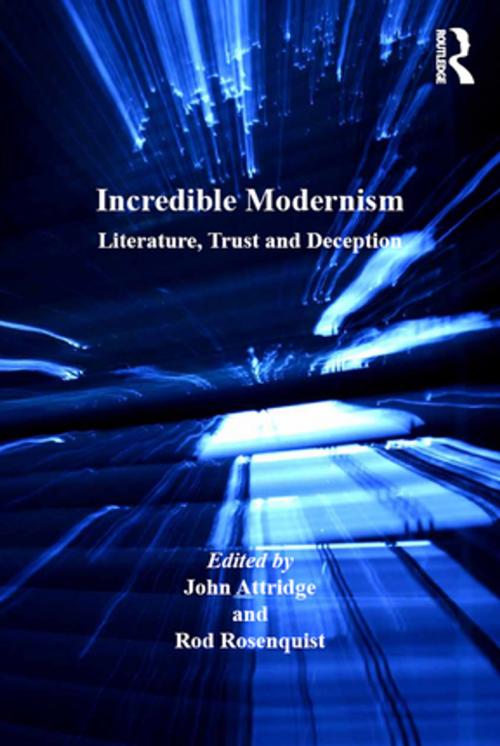Incredible Modernism
Literature, Trust and Deception
Fiction & Literature, Literary Theory & Criticism| Author: | John Attridge | ISBN: | 9781317117544 |
| Publisher: | Taylor and Francis | Publication: | May 23, 2016 |
| Imprint: | Routledge | Language: | English |
| Author: | John Attridge |
| ISBN: | 9781317117544 |
| Publisher: | Taylor and Francis |
| Publication: | May 23, 2016 |
| Imprint: | Routledge |
| Language: | English |
With the twentieth century came a new awareness of just how much an individual was obliged to accept on trust, and this heightened awareness of social trust in turn prompted new kinds of anxiety about fraudulence and deception. Beginning with the premise that the traditional liberal concept of trust as a ’bond of society’ entered a period of crisis around the turn of the twentieth century, this collection examines the profound influence of this shift on a wide range of modernist writers, including James Joyce, Marcel Proust, Gertrude Stein, Ezra Pound, Wyndham Lewis, H.D., Ford Madox Ford, Samuel Beckett, Ralph Ellison and Wallace Stevens. In examining the importance of trust and fraudulence during the period, the contributors take up a diverse set of topics related to reception, the institutions of modernism, the history of authorship, the nature of representation, authenticity, genre, social order and politics. Taken as a whole, Incredible Modernism provides concrete historical coordinates for the study of twentieth-century trust, while also arguing that a problem of trust is central to the institutions and formal innovations of modernism itself.
With the twentieth century came a new awareness of just how much an individual was obliged to accept on trust, and this heightened awareness of social trust in turn prompted new kinds of anxiety about fraudulence and deception. Beginning with the premise that the traditional liberal concept of trust as a ’bond of society’ entered a period of crisis around the turn of the twentieth century, this collection examines the profound influence of this shift on a wide range of modernist writers, including James Joyce, Marcel Proust, Gertrude Stein, Ezra Pound, Wyndham Lewis, H.D., Ford Madox Ford, Samuel Beckett, Ralph Ellison and Wallace Stevens. In examining the importance of trust and fraudulence during the period, the contributors take up a diverse set of topics related to reception, the institutions of modernism, the history of authorship, the nature of representation, authenticity, genre, social order and politics. Taken as a whole, Incredible Modernism provides concrete historical coordinates for the study of twentieth-century trust, while also arguing that a problem of trust is central to the institutions and formal innovations of modernism itself.















